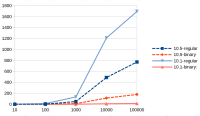Details
-
Bug
-
Status: Closed (View Workflow)
-
Blocker
-
Resolution: Fixed
-
10.5.9, 10.5.13
-
Linux
Description
table with primery key binary(16)
`SELECT from table WHERE key IN (binary form ids, ....)` is extremly slow
while
`SELECT from table WHERE key IN ((0x11e6a2ad166fc342abde002590a2360a),
(0x11e6a2ad16750370aeaf002590a2360a),
(0x11e6a2ad167a186a9e19002590a2360a),....)`
is perfectly fast.
IDs in binary form I mean this: https://tinyurl.com/ycfyftby
Attachments
Issue Links
- causes
-
MDEV-29242 Assertion `computed_weight == weight' failed SEL_ARG::verify_weight
-
- Closed
-
- is caused by
-
MDEV-9750 Quick memory exhaustion with 'extended_keys=on' on queries having multiple 'IN'/'NOT IN' using InnoDB
-
- Closed
-
- relates to
-
MDEV-27530 InnoDB - Performance issues after upgrade 10.4.22 to 10.5.13
-
- Closed
-
-
MDEV-28518 After update to 10.5 a lot of time is spent in "Sending data"
-
- Closed
-
-
MDEV-28638 ANALYZE FORMAT=JSON should print time spent in the optimizer
-
- Closed
-
